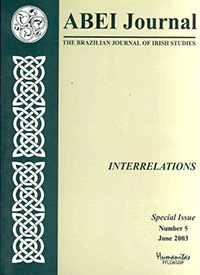Infinite Regress and the Darkness of Reason – Flann O’Brien’s The Third Policeman in the Context of Greek Cosmology
DOI:
https://doi.org/10.37389/abei.v5i1.183810Abstract
Few fictional fates can be as bleak as that of the narrator in Flann O’Brien’s The Third Policeman. The reader sees it, even if he doesn’t. When he (the narrator) reaches the end of his story, he finds only another beginning, a repetition, words used before [...]. The reader can check – can verify the pattern; but for the nameless victim, this is something new, a little strange, a little puzzling. He’s no wiser, no better – no older – than before. He’s moving, but he’s in the same place. Infinite regress is the principal postulate of Flann O’Brien’s work. The figure is there in the first novel, At Swim-Two-Birds, through the receding sequence of narratives-within-narratives. It is there in this, his second, suppressed, novel, in the ever-smaller, ever-less-visible boxes of Policeman MacCruiskeen (and much more besides). There is a hint of it too in his image of the Irish artist sitting fully dressed, innerly locked in the toilet of a locked coach where he has no right to be, resentfully drinking somebody else’s whiskey – the coach in question sitting inside a railway tunnel (from ‘A Bash in the Tunnel’, his essay on James Joyce). Through the copious material relating to de Selby (mostly footnotes), The Third Policeman brings forward a number of pseudo-rational theories on various aspects of the physical universe (our universe). Through the principal narrative, it offers an attempted description of a different universe, where the ‘rational’ breaks down, and the ‘inconceivable’ somehow actually happens. The present article is an attempt to show how this double focus of the novel constitutes a formal unity, through an exploration of O’Brien’s philosophical debt to such thinkers as Parmenides, Zeno, and Democritus. In their theories, and disputes, may be found the seeds of many of the ideas and episodes present in the work.
References
Cartledge, Paul. Democritus. London: Phoenix, 1997.
Clune, Anne and Hurson, Tess (Ed.). Conjuring Complexities: Essays on Flann, O’Brien. Belfast:
Institute of Irish Studies.1997.
Cronin, Anthony (1989), No Laughing Matter: The Life and Times of Flann O’Brien. London: Grafton
Books.
Honderich, Ted (Ed.). The Oxford Companion to Philosophy. Oxford: OUP, 1995.
O’Brien, Flann. The Third Policeman. London: Picador. (Original edition, 1967, London: MacGibbon
and Kee.), 1974.
Ricken, Friedo. Philosophy of the Ancients. Indiana: University of Notre Dame Press, 1991.
Russell, Bertrand. History of Western Philosophy. 2nd Ed., London: Allen and Unwin, 1961.
O’Brien, Flann, ‘A Bash in the Tunnel’. Context: http://www.centerforbookculture.org/context/
index.html
Internet Encyclopedia of Philosophy. http://www.utm.edu/research/iep/
Maths Pages, ‘Reflections on Relativity: Zeno and the Paradox of Motion’. http://www.mathpages.
com/rr/s3-07/3-07.htm
Olivotto, Roberta– Epistemology and Science in The Third Policeman. http://digilander.libero.it/
robey/struttura/flannobrien/texts/third.htm
Parmenides, On Nature. Randall, Allan F.(Ed.). ‘Commentary on Parmenides’. http://home.ican.net/
~arandall/Parmenides
Plato, Parmenides 132-3 – Cornford translation. http://faculty.washington.edu/smcohen/parm132.html
‘Zeno’s Paradoxes’ – extract from Barnes, Jonathan (Ed.). Collected Works of Aristotle, OUP, 1991.
Downloads
Published
Issue
Section
License
Copyright (c) 2003 Nigel Hunter

This work is licensed under a Creative Commons Attribution-NonCommercial 4.0 International License.


